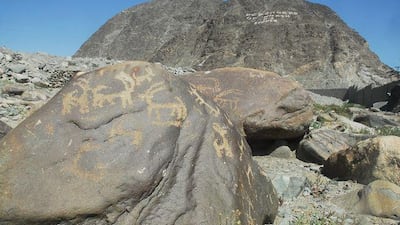CHILAS, PAKISTAN // Thousands of relics charting the course of history of Pakistan's mountainous north to as far back as 9000BC will be lost during the construction of a major dam, archaeologists said. Physical isolation had conserved some 55,000 rock carvings and inscriptions made by invaders, traders, pilgrims and inhabitants, largely between the first century BC and the 16th century advent of Islam in the area, until the 1960s, when engineers began construction of a road between Pakistan and China.
The route of the 1,300-km Karakorum Highway (KKH) traced the route of an ancient Silk Road and, soon after its completion in 1978, German and Pakistani archaeologists launched a survey of the region. Their biggest find was the "talking rocks" which, by coincidence of engineering convenience, literally lined a 70-km stretch of the KKH in the high altitude desert of the upper Indus River valley between Shatial and Chilas, about 475km north of Islamabad.
Between 1985 and 2007, archaeologists from the Heidelberg Academy of Sciences and Humanities documented the historical graffiti, some of which dated back to the Neolithic Age between 7000BC and 8000BC. A photographic exhibition at the National Art Gallery in Islamabad last month revealed petroglyphs of leopards and antelopes drawn by Persian Scythian nomads in the 1st century BC and warriors on horseback carved by 1st century AD Parthian invaders.
The exhibition showed that Chinese and Tibetan pilgrims, travelling to what are now Taliban-infested areas of north-west Pakistan, made the greatest contribution, carving and etching thousands of pictures of Buddha and the shrines they had worshipped at between the 4th and 7th centuries AD. Eighth-century images show Hindu warriors waving axes at sword-bearing Arab invaders, who left behind drawings of ibex.
Conveniently for archaeologists, the images were often finished with writing in the language of the travellers, many of whom recorded their anxiety about the stress of the journey, along with dates and their destination. However, precious few of the thousands of talking rocks will survive the forthcoming construction of the Basha-Diamer dam, an estimated US$11 billion (Dh40.4bn) hydroelectric project desperately needed to plug Pakistan's power gap, said Professor Harald Hauptmann of the Heidelberg Academy.
He told Dawn newspaper that 70 per cent of the rocks would be submerged in the dam reservoir and another 20 per cent lost because of subsequent rerouting of the KKH and resettling of some 28,000 people from 30 villages that will be submerged. Pakistani officials based in Gilgit, capital of the Northern Areas administrative region, said a rising dispute over compensation with the government had last year turned the relics into an explosive bargaining chip for affected villagers.
Some 800 of them, having won a court case establishing hereditary ownership of a swath of land in Shatial, blocked the KKH and threatened to blow up the petroglyph-bearing rocks unless the compensation was increased. "They were only narrowly persuaded by the police not to destroy the site," said an official of the department of archaeology, speaking on condition of anonymity. The official, who had not been authorised to speak by his employers, said the area's modern-day population and the government had generally ignored the relics, to the extent that the sites had only last year been signposted.
General ignorance of their historical importance had been highlighted, in difficult-to-remove whitewash, by the Frontier Works Organisation, a military road builder, and the department of population welfare, both of which daubed glyph-bearing rocks as part of mountainside marketing exercises, he said. Farooq Ahmed, a local journalist, said construction activity along the KKH, which is currently being rehabilitated by Chinese engineers, had already consumed a significant number of talking rocks, particularly in valleys off the main motorway.
"I have travelled extensively in the area over the last two years and I kept on seeing rocks turned into building materials by local contractors," he said. The department of archaeology official said the government had formed a task force of officials and local academics to remove and conserve prominent talking rocks and house them in proposed museums at Gilgit and Chilas. Assistance for the projects is on offer from the German and Japanese governments, but the work of the task force is still in its initial stages and already falling behind the schedule for the imminent construction of the Diamer-Basha dam, he said.
"It is highly unlikely that we will be able to save anything but a fraction of the talking rocks. There are so many of them and they are so big and heavy that it is not feasible to remove them," the official said. The Heidelberg academy team of archaeologists foresaw the loss of heritage, prompting them to scan the historically most valuable petroglyphs and conserve them for posterity in 3D imagery, as displayed at the exhibition in Islamabad.
That, sighed Prof Hauptmann, the team leader, is where the story will likely end. "If I could, I would have stopped everything to preserve our common heritage for generations to come. But unfortunately I am too old to put up a fight. It's just a dream now," he said. thussain@thenational.ae

